外研版(2019) 必修 第三册 Unit 6 Disaster and hope Grammar & Vocabulary课件(共41张PPT)
文档属性
| 名称 | 外研版(2019) 必修 第三册 Unit 6 Disaster and hope Grammar & Vocabulary课件(共41张PPT) |  | |
| 格式 | zip | ||
| 文件大小 | 9.4MB | ||
| 资源类型 | 教案 | ||
| 版本资源 | 外研版(2019) | ||
| 科目 | 英语 | ||
| 更新时间 | 2023-03-12 12:13:04 | ||
图片预览

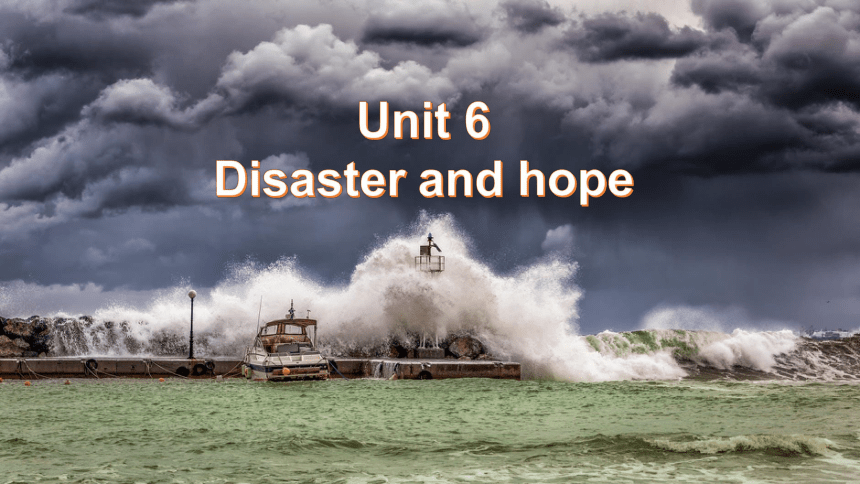
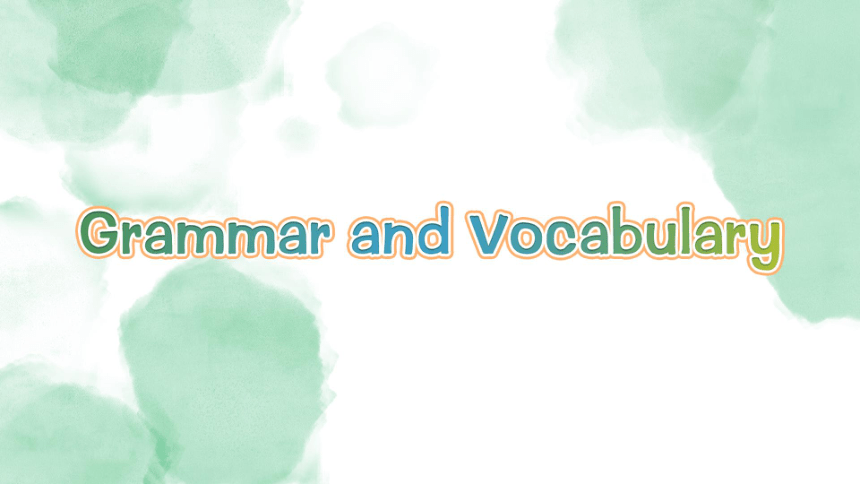
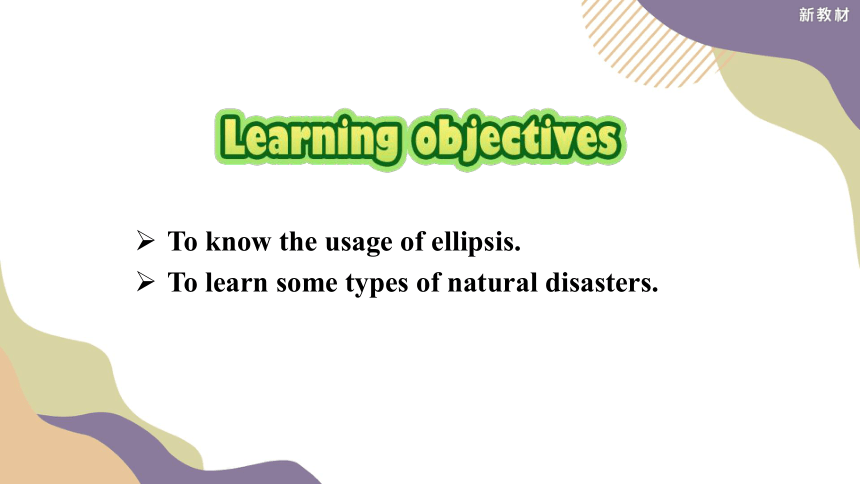
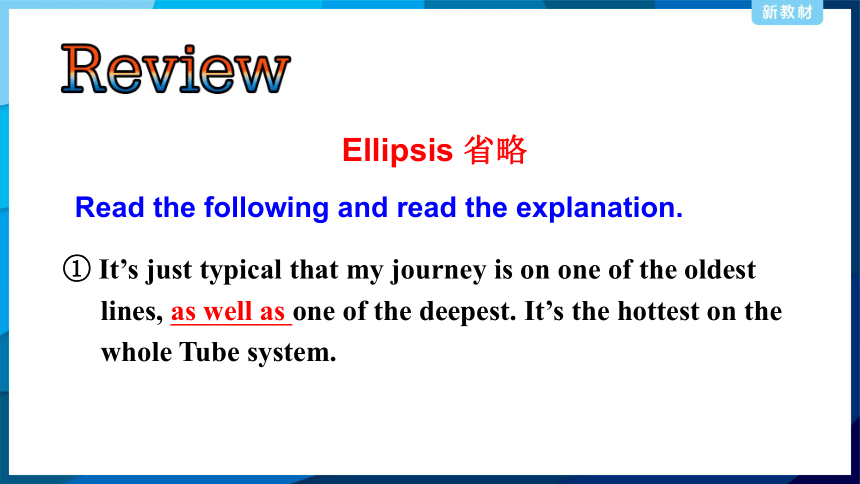
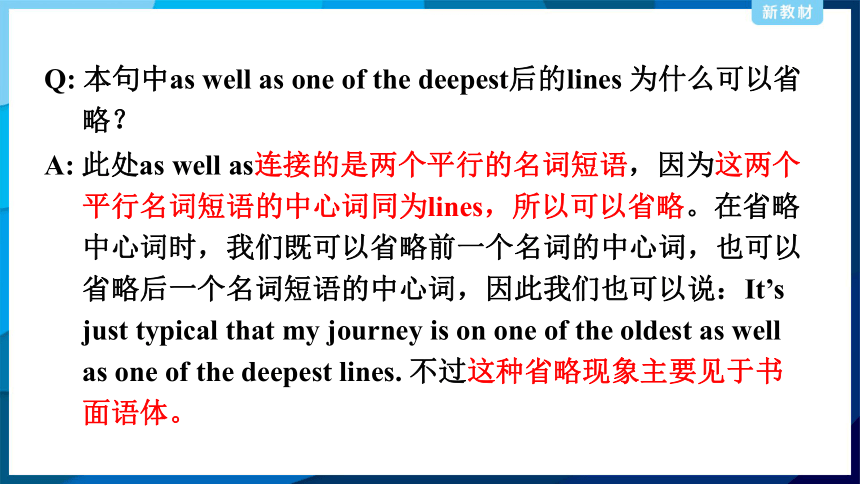
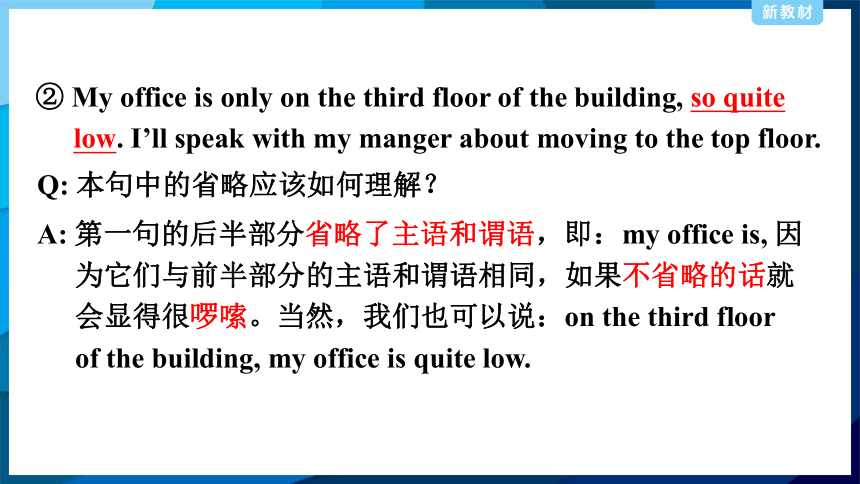
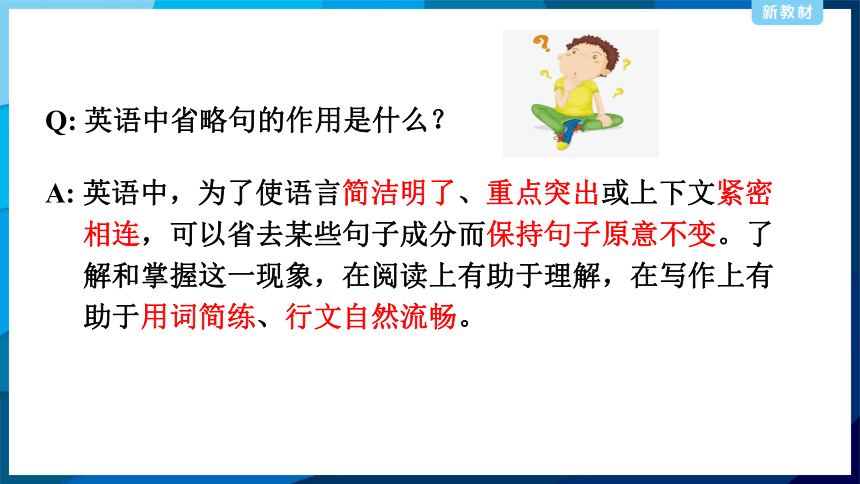
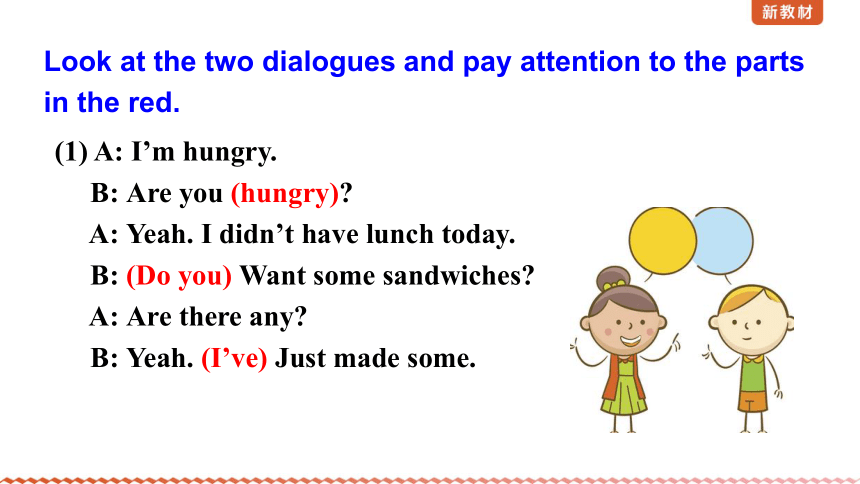
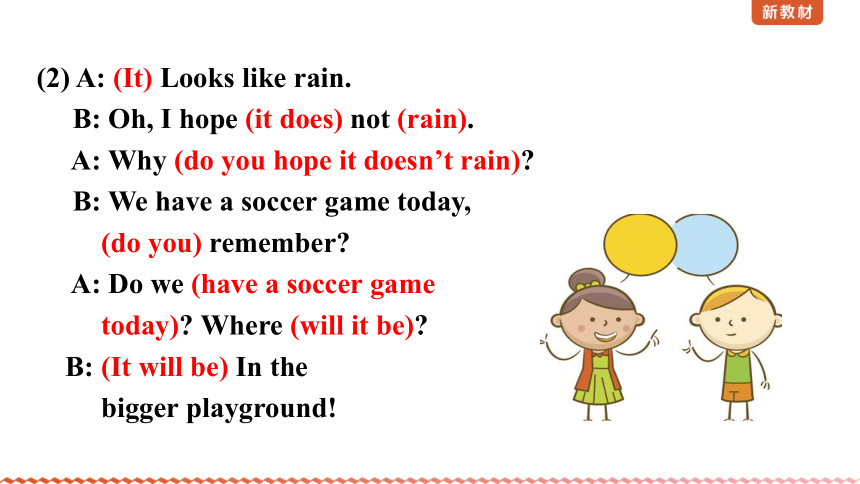
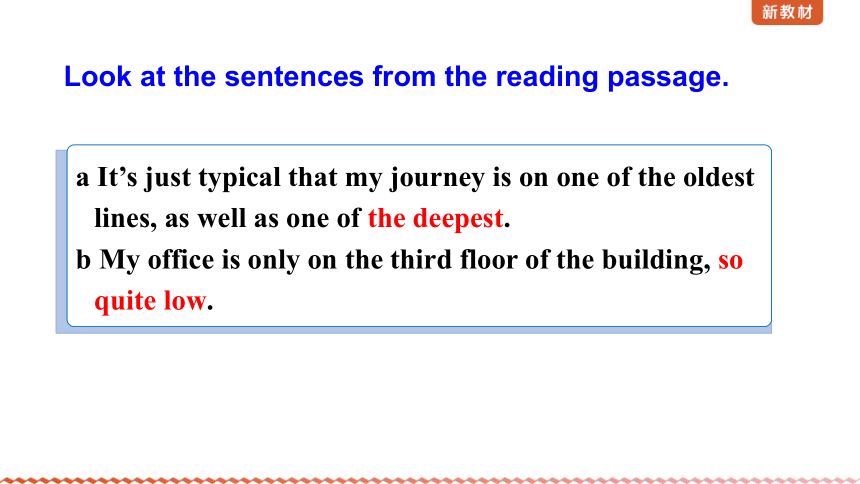
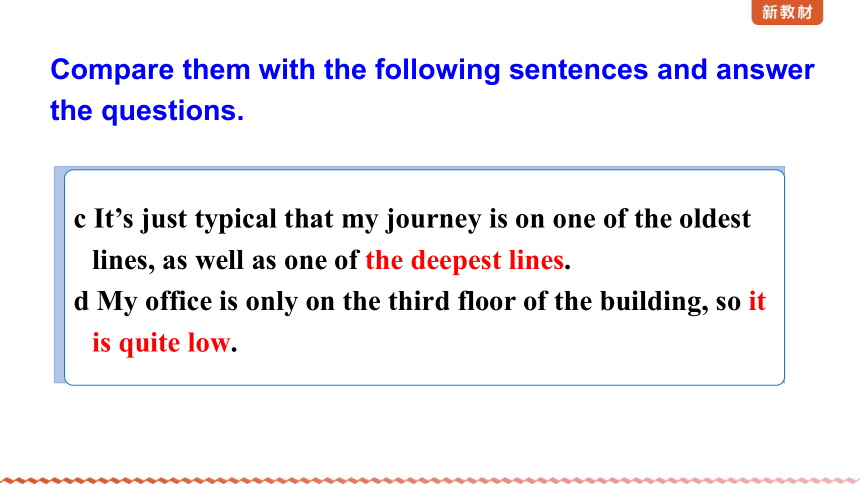
文档简介
(共41张PPT)
Unit 6
Unit 6
Disaster and hope
To know the usage of ellipsis.
To learn some types of natural disasters.
Ellipsis 省略
Read the following and read the explanation.
① It’s just typical that my journey is on one of the oldest lines, as well as one of the deepest. It’s the hottest on the whole Tube system.
Q: 本句中as well as one of the deepest后的lines 为什么可以省略?
A: 此处as well as连接的是两个平行的名词短语,因为这两个平行名词短语的中心词同为lines,所以可以省略。在省略中心词时,我们既可以省略前一个名词的中心词,也可以省略后一个名词短语的中心词,因此我们也可以说:It’s just typical that my journey is on one of the oldest as well as one of the deepest lines. 不过这种省略现象主要见于书面语体。
② My office is only on the third floor of the building, so quite low. I’ll speak with my manger about moving to the top floor.
Q: 本句中的省略应该如何理解?
A: 第一句的后半部分省略了主语和谓语,即:my office is, 因为它们与前半部分的主语和谓语相同,如果不省略的话就会显得很啰嗦。当然,我们也可以说:on the third floor of the building, my office is quite low.
Q: 英语中省略句的作用是什么?
A: 英语中,为了使语言简洁明了、重点突出或上下文紧密相连,可以省去某些句子成分而保持句子原意不变。了解和掌握这一现象,在阅读上有助于理解,在写作上有助于用词简练、行文自然流畅。
Look at the two dialogues and pay attention to the parts in the red.
(1) A: I’m hungry.
B: Are you (hungry)
A: Yeah. I didn’t have lunch today.
B: (Do you) Want some sandwiches
A: Are there any
B: Yeah. (I’ve) Just made some.
(2) A: (It) Looks like rain.
B: Oh, I hope (it does) not (rain).
A: Why (do you hope it doesn’t rain)
B: We have a soccer game today,
(do you) remember
A: Do we (have a soccer game
today) Where (will it be)
B: (It will be) In the
bigger playground!
Look at the sentences from the reading passage.
a It’s just typical that my journey is on one of the oldest lines, as well as one of the deepest.
b My office is only on the third floor of the building, so quite low.
c It’s just typical that my journey is on one of the oldest lines, as well as one of the deepest lines.
d My office is only on the third floor of the building, so it is quite low.
Compare them with the following sentences and answer the questions.
1. What has been left out in sentences (a) and (b)
“Lines” has been left out in sentence (a), and “it is” has been left out in sentence (b).
2 Why does the author leave them out
The author leaves them out to avoid repeating the word or expression that is too obvious, and to make the sentences more concise.
Now look for more sentences with ellipsis in the reading passage.
It’s lovely at the beach, but not so when you’re wearing a suit and in a crowd of passengers!
One very hot summer, the sun reflected off it and melted cars parked below!
省略是一种避免重复、突出新信息并使上下文紧密连接的语法手段。与汉语-样,英语中的省略也较为常见。
一般来说,只要不损害结构或引起歧义,能省略的地方就可以省略。
省略的意义:可使语言更加简洁,意思更加明确,句子结构更加紧凑。
省略 (Ellipsis)
省略是指省去可以根据上下文语境或情景语境恢复的句子成分。英语中存在多种多样的省略现象,句子中既可以省略主语、谓语、谓语的一部分或宾语,也可以一起省略主语和谓语。省略在口语和书面语中都非常普遍。省略的使用包括但不局限于以下情况:
What is ellipsis?
一、简单句的省略
1. 省略主语
祈使句中主语通常省略; 其它省略主语多限于少数现成的说法。
(1) (I) Thank you for your help.
(2) (I) See you tomorrow.
(3) (It) Doesn’t matter.
(4) (I) Beg your pardon.
2. 省略主谓或主谓语的一部分
(1) (There is) No smoking.
(2) (Is there) Anything wrong
(3) (Will you) Have a smoke
(4) What/How (do you think) about a cup of tea
(5) Why (do you) not say hello to him
3. 省略作宾语的不定式短语,只保留to, 但如果该宾语是动词
be或完成时态,则须在之后加上be或have:
(1) –Are you going there
–Yes, I’d like to (go there).
(2) He didn’t give me the chance, though he had promised
to (give me the chance).
(3) –Are you an engineer
–No, but I want to be (an engineer).
(4) –He hasn’t finished the task yet.
–Well, he ought to have (finished the task).
4. 省略表语
(1) –Are you thirsty
– Yes, I am (thirsty).
(2) His brother isn’t lazy, nor is his sister (lazy).
5. 同时省略几个成分
(1) Let’s meet at the same place as (we met) yesterday.
(2) –Have you finished your work
– (I have) Not (finished my work) yet.
二、主从复合句中的省略及其他情况的省略。
1. 主句中有一些成分被省略
(1) (I’m) Sorry to hear you are ill.
(2) (It’s a) Pity that he missed such a good chance.
情况 例句
并列句 She went to the clinic and (she) saw a doctor.
Sally will be arriving today and Ann (will be arriving) tomorrow.
John once smoked like a chimney, but he doesn’t (smoke) now.
表示比较的从句 She looks older than my mother (does).
The weather isn’t as good as (it was) yesterday.
对话 (I’m) Sorry I couldn’t come.
(Pass me) The salt, please.
A: Are you coming
B: Yes (I’m coming).
2.其他情况的省略
情况 例句
告示、标牌、报纸标题 (There will be) Road works ahead!
(A) Millionaire (was) poisoned (in his home) in Beverly Hills.
习惯用语 We need to solve the problem as soon as (it is) possible.
Why not (=Why don’t you) clean the room after
breakfast
将下列句子改写为省略句。
1. I’m not listening to music now, but I was listening to
music in the morning.
________________________________________________
2. Mrs. Smith won’t attend the party unless she is invited.
________________________________________________
3. The boy didn’t want to take these tablets, but he had to
take them.
________________________________________________
I’m not listening to music now, but I was in the morning.
Mrs. Smith won’t attend the party unless invited.
The boy didn’t want to take these tablets, but he had to.
Read the paragraph and find out what words have been removed before or after the underlined words.
Technology isn’t the only way to forecast the weather. Nature has its ways (____________________), too. Unusual animal behavior, for example, can indicate whether it’s cold, wet weather that’s on the way or a hot, dry period (_________________). If fish are jumping higher than usual or frogs are croaking more loudly (_________), it may rain. And next time you look up at the sky, don’t just look for rain clouds, but also (______) for birds.
to forecast the weather
that’s on the way
than usual
look
If they are flying low, grab your umbrella. It is also said that mice and snakes head for safer ground several days before an earthquake, while dogs avoiding the beach may be a sign that a tsunami is approaching. Of course, although these things may suggest something bad is going to happen, they won’t tell us when (______________________________) and where (______________________________). So, for accurate and reliable predictions, it’s best to check an official, scientific report.
something bad it going to happen
something bad it going to happen
Remove words from the news report to make it more concise.
The 8.1-magnitude earthquake that hit Nepal on 25 April 2015, was one of the worst (earthquakes) in history. On hearing the news, China was quick to start organising emergency aid.
International rescue teams soon began to arrive in the country. Amongst all the international heavy rescue teams, the China International Search and Rescue Team (CISAR) was the first (international heavy rescue team) to arrive.
Consisting of 62 people, it not only included rescuers and medical staff, but also (included) earthquake experts. By early May, emergency aid worth 9.7 million US dollars had been donated by China, with a further round (of emergency aid) to follow.
Look at the pictures and answer the questions.
drought
typhoon
tsunami
wildfire
avalanche
earthquake
blizzard
Types of natural disasters
1. Which one do you think is the most dangerous
2. Can you name some big natural disasters in history
I think all of them are dangerous.
The earthquake happened in 2008 in Sichuan, China; the tsunami happened in 2004 in Indonesia.
Complete the reports with the words in Activity 4. Pay attention to the words describing natural disasters.
In 1881, an __________ struck the small Vietnamese city of Haiphong, bringing terrible strong winds. When it hit the coast, huge tidal waves caused severe flood, costing the lives of up to 300,000 citizens.
typhoon
In August 1949, the Landes region of South-west France faced a major ________ that lasted almost a week. Some 500 km of forested land was burnt and 82 people killed. Even today, it is considered one of Europe’s most deadly forest fires.
wildfire
The winter of 1950 to 1951 came to be known as the Winter of Terror when over 600 ___________ struck towns and villages in the mountains of the Swiss-Austrian Alps. Caused by exceptionally heavy snowfall within a short period of time, they destroyed buildings and forests, and claimed over 256 lives.
avalanches
In 1960, Chile suffered the strongest ____________ to be recorded in the 20th century. The shock is generally agreed to have had a magnitude of 9.5. It caused a(n) _______ with waves of up to 25 metres affecting places as far away as Hawaii and Japan.
earthquake
tsunami
A(n) _________ hit Iran in February 1972, causing a week of extremely low temperatures. Winter storms brought as much as 7.9 metres of snow in the south of the country, resulting in the deaths of about 4,000 people.
blizzard
In July 2011, a(n) __________ struck East Africa. It was said to be the worst in 60 years, and not a single drop of rain fell for almost a whole year. It led to a severe food crisis and threatened the livelihoods of more than 9.5 million people.
drought
Talk about a recent natural disaster you have heard about or seen on the news.
Locust disaster
Do you know any other natural disasters Make a list of natural disasters.
Describe one natural disaster you have heard about or seen on the news.
Unit 6
Unit 6
Disaster and hope
To know the usage of ellipsis.
To learn some types of natural disasters.
Ellipsis 省略
Read the following and read the explanation.
① It’s just typical that my journey is on one of the oldest lines, as well as one of the deepest. It’s the hottest on the whole Tube system.
Q: 本句中as well as one of the deepest后的lines 为什么可以省略?
A: 此处as well as连接的是两个平行的名词短语,因为这两个平行名词短语的中心词同为lines,所以可以省略。在省略中心词时,我们既可以省略前一个名词的中心词,也可以省略后一个名词短语的中心词,因此我们也可以说:It’s just typical that my journey is on one of the oldest as well as one of the deepest lines. 不过这种省略现象主要见于书面语体。
② My office is only on the third floor of the building, so quite low. I’ll speak with my manger about moving to the top floor.
Q: 本句中的省略应该如何理解?
A: 第一句的后半部分省略了主语和谓语,即:my office is, 因为它们与前半部分的主语和谓语相同,如果不省略的话就会显得很啰嗦。当然,我们也可以说:on the third floor of the building, my office is quite low.
Q: 英语中省略句的作用是什么?
A: 英语中,为了使语言简洁明了、重点突出或上下文紧密相连,可以省去某些句子成分而保持句子原意不变。了解和掌握这一现象,在阅读上有助于理解,在写作上有助于用词简练、行文自然流畅。
Look at the two dialogues and pay attention to the parts in the red.
(1) A: I’m hungry.
B: Are you (hungry)
A: Yeah. I didn’t have lunch today.
B: (Do you) Want some sandwiches
A: Are there any
B: Yeah. (I’ve) Just made some.
(2) A: (It) Looks like rain.
B: Oh, I hope (it does) not (rain).
A: Why (do you hope it doesn’t rain)
B: We have a soccer game today,
(do you) remember
A: Do we (have a soccer game
today) Where (will it be)
B: (It will be) In the
bigger playground!
Look at the sentences from the reading passage.
a It’s just typical that my journey is on one of the oldest lines, as well as one of the deepest.
b My office is only on the third floor of the building, so quite low.
c It’s just typical that my journey is on one of the oldest lines, as well as one of the deepest lines.
d My office is only on the third floor of the building, so it is quite low.
Compare them with the following sentences and answer the questions.
1. What has been left out in sentences (a) and (b)
“Lines” has been left out in sentence (a), and “it is” has been left out in sentence (b).
2 Why does the author leave them out
The author leaves them out to avoid repeating the word or expression that is too obvious, and to make the sentences more concise.
Now look for more sentences with ellipsis in the reading passage.
It’s lovely at the beach, but not so when you’re wearing a suit and in a crowd of passengers!
One very hot summer, the sun reflected off it and melted cars parked below!
省略是一种避免重复、突出新信息并使上下文紧密连接的语法手段。与汉语-样,英语中的省略也较为常见。
一般来说,只要不损害结构或引起歧义,能省略的地方就可以省略。
省略的意义:可使语言更加简洁,意思更加明确,句子结构更加紧凑。
省略 (Ellipsis)
省略是指省去可以根据上下文语境或情景语境恢复的句子成分。英语中存在多种多样的省略现象,句子中既可以省略主语、谓语、谓语的一部分或宾语,也可以一起省略主语和谓语。省略在口语和书面语中都非常普遍。省略的使用包括但不局限于以下情况:
What is ellipsis?
一、简单句的省略
1. 省略主语
祈使句中主语通常省略; 其它省略主语多限于少数现成的说法。
(1) (I) Thank you for your help.
(2) (I) See you tomorrow.
(3) (It) Doesn’t matter.
(4) (I) Beg your pardon.
2. 省略主谓或主谓语的一部分
(1) (There is) No smoking.
(2) (Is there) Anything wrong
(3) (Will you) Have a smoke
(4) What/How (do you think) about a cup of tea
(5) Why (do you) not say hello to him
3. 省略作宾语的不定式短语,只保留to, 但如果该宾语是动词
be或完成时态,则须在之后加上be或have:
(1) –Are you going there
–Yes, I’d like to (go there).
(2) He didn’t give me the chance, though he had promised
to (give me the chance).
(3) –Are you an engineer
–No, but I want to be (an engineer).
(4) –He hasn’t finished the task yet.
–Well, he ought to have (finished the task).
4. 省略表语
(1) –Are you thirsty
– Yes, I am (thirsty).
(2) His brother isn’t lazy, nor is his sister (lazy).
5. 同时省略几个成分
(1) Let’s meet at the same place as (we met) yesterday.
(2) –Have you finished your work
– (I have) Not (finished my work) yet.
二、主从复合句中的省略及其他情况的省略。
1. 主句中有一些成分被省略
(1) (I’m) Sorry to hear you are ill.
(2) (It’s a) Pity that he missed such a good chance.
情况 例句
并列句 She went to the clinic and (she) saw a doctor.
Sally will be arriving today and Ann (will be arriving) tomorrow.
John once smoked like a chimney, but he doesn’t (smoke) now.
表示比较的从句 She looks older than my mother (does).
The weather isn’t as good as (it was) yesterday.
对话 (I’m) Sorry I couldn’t come.
(Pass me) The salt, please.
A: Are you coming
B: Yes (I’m coming).
2.其他情况的省略
情况 例句
告示、标牌、报纸标题 (There will be) Road works ahead!
(A) Millionaire (was) poisoned (in his home) in Beverly Hills.
习惯用语 We need to solve the problem as soon as (it is) possible.
Why not (=Why don’t you) clean the room after
breakfast
将下列句子改写为省略句。
1. I’m not listening to music now, but I was listening to
music in the morning.
________________________________________________
2. Mrs. Smith won’t attend the party unless she is invited.
________________________________________________
3. The boy didn’t want to take these tablets, but he had to
take them.
________________________________________________
I’m not listening to music now, but I was in the morning.
Mrs. Smith won’t attend the party unless invited.
The boy didn’t want to take these tablets, but he had to.
Read the paragraph and find out what words have been removed before or after the underlined words.
Technology isn’t the only way to forecast the weather. Nature has its ways (____________________), too. Unusual animal behavior, for example, can indicate whether it’s cold, wet weather that’s on the way or a hot, dry period (_________________). If fish are jumping higher than usual or frogs are croaking more loudly (_________), it may rain. And next time you look up at the sky, don’t just look for rain clouds, but also (______) for birds.
to forecast the weather
that’s on the way
than usual
look
If they are flying low, grab your umbrella. It is also said that mice and snakes head for safer ground several days before an earthquake, while dogs avoiding the beach may be a sign that a tsunami is approaching. Of course, although these things may suggest something bad is going to happen, they won’t tell us when (______________________________) and where (______________________________). So, for accurate and reliable predictions, it’s best to check an official, scientific report.
something bad it going to happen
something bad it going to happen
Remove words from the news report to make it more concise.
The 8.1-magnitude earthquake that hit Nepal on 25 April 2015, was one of the worst (earthquakes) in history. On hearing the news, China was quick to start organising emergency aid.
International rescue teams soon began to arrive in the country. Amongst all the international heavy rescue teams, the China International Search and Rescue Team (CISAR) was the first (international heavy rescue team) to arrive.
Consisting of 62 people, it not only included rescuers and medical staff, but also (included) earthquake experts. By early May, emergency aid worth 9.7 million US dollars had been donated by China, with a further round (of emergency aid) to follow.
Look at the pictures and answer the questions.
drought
typhoon
tsunami
wildfire
avalanche
earthquake
blizzard
Types of natural disasters
1. Which one do you think is the most dangerous
2. Can you name some big natural disasters in history
I think all of them are dangerous.
The earthquake happened in 2008 in Sichuan, China; the tsunami happened in 2004 in Indonesia.
Complete the reports with the words in Activity 4. Pay attention to the words describing natural disasters.
In 1881, an __________ struck the small Vietnamese city of Haiphong, bringing terrible strong winds. When it hit the coast, huge tidal waves caused severe flood, costing the lives of up to 300,000 citizens.
typhoon
In August 1949, the Landes region of South-west France faced a major ________ that lasted almost a week. Some 500 km of forested land was burnt and 82 people killed. Even today, it is considered one of Europe’s most deadly forest fires.
wildfire
The winter of 1950 to 1951 came to be known as the Winter of Terror when over 600 ___________ struck towns and villages in the mountains of the Swiss-Austrian Alps. Caused by exceptionally heavy snowfall within a short period of time, they destroyed buildings and forests, and claimed over 256 lives.
avalanches
In 1960, Chile suffered the strongest ____________ to be recorded in the 20th century. The shock is generally agreed to have had a magnitude of 9.5. It caused a(n) _______ with waves of up to 25 metres affecting places as far away as Hawaii and Japan.
earthquake
tsunami
A(n) _________ hit Iran in February 1972, causing a week of extremely low temperatures. Winter storms brought as much as 7.9 metres of snow in the south of the country, resulting in the deaths of about 4,000 people.
blizzard
In July 2011, a(n) __________ struck East Africa. It was said to be the worst in 60 years, and not a single drop of rain fell for almost a whole year. It led to a severe food crisis and threatened the livelihoods of more than 9.5 million people.
drought
Talk about a recent natural disaster you have heard about or seen on the news.
Locust disaster
Do you know any other natural disasters Make a list of natural disasters.
Describe one natural disaster you have heard about or seen on the news.
